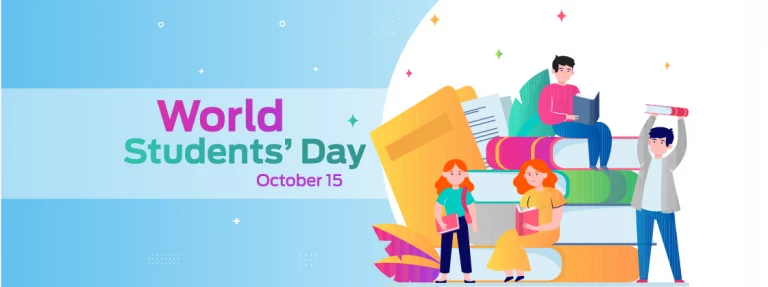Each year, on 15 October, the world — or at least a large part of the global education community — pauses to observe world students day. In 2025, that date falls on a Wednesday. The day carries a special resonance: it honours students across nations and celebrates their potential to reshape society. But more than that, world students day is deeply tied to the legacy of one individual whose life and ideas still inspire youth and educators alike.
Often, when Nigerians see the term “world students day,” they assume it refers to a United Nations-designated observance. In truth, the association with the UN is more a misconception than a fact. While October 15 is officially the International Day of Rural Women under the UN calendar, the practice of marking 15 October as world students day originates largely in India, in tribute to Dr. A. P. J. Abdul Kalam, the late scientist-statesman who remained a beloved mentor to students till his final days.
Still, over the years, the idea of world students day has spread beyond India’s borders, adopted by schools, institutions, and youth groups in many countries—including Nigeria. On this day, forums, lectures, campaigns, and student reflections aim to highlight educational challenges, uplift student voices, and keep alive the vision of a future built by educated minds.
In this article, we explore the theme for 2025, trace the history of world students day, examine its significance today, and reflect on how Nigerian students in particular might mark the occasion.

Table of Contents
From Kalam’s Birthday to Global Observance: History and Origins
The roots of world students day lie firmly at the intersection of science, education, and youthful ambition. Dr. Avul Pakir Jainulabdeen (A. P. J.) Abdul Kalam was born on 15 October 1931 in the small town of Rameswaram, in Tamil Nadu, India. He rose from modest beginnings to become a distinguished aeronautical engineer, heading key projects in India’s missile and space programmes, and later served as the nation’s 11th President (2002–2007), according to National Today.
But his identity as “People’s President” came not merely from his scientific contributions, but from his affection for students and education. Even beyond his presidency, Kalam devoted much of his energy to teaching, visiting schools and universities, answering students’ questions, and encouraging them to dream and pursue innovation.
In 2010, India began formally observing 15 October as World Students’ Day to commemorate his birthday and to honour his bond with students. Over time, the term “world students day” came to be used in various countries and educational settings, though the designation does not rest on a formal United Nations resolution.
It is important to note: despite widespread belief to the contrary, the UN has not officially recognised 15 October as world students day. The UN’s observance for that date is instead the International Day of Rural Women. Still, many institutions—especially in South Asia and parts of Africa—embrace world students day as a meaningful occasion to reflect on student welfare and educational priorities.
Over the years, educational thinkers have proposed different themes to guide each year’s observance. These themes encourage students and institutions to channel their energies toward particular goals—such as resilience, innovation, inclusion, or the power of learning from failure.
As world students day 2025 approaches, much attention turns to the theme that will steer reflections, events, and campaigns. The annual theme gives shape to discussions about student challenges and aspirations.
Theme & Significance: Why World Students’ Day Matters in 2025
The Theme for 2025
By the time of writing, an official theme for world students day 2025 has not yet been confirmed in most sources. In 2024, the theme was “Empowering Students to be Agents of Change,” urging learners to see themselves not merely as recipients of knowledge but as active contributors to society. Previous years have featured themes like “FAIL: First Attempt in Learning,” which reframed failure as a step toward growth.
Given these precedents, anticipated themes for 2025 are likely to revolve around resilience, digital transformation, equity in education, or student empowerment in an increasingly complex world. Whoever shapes the theme will be signalling the most urgent priorities for youth and learning in this moment.
What World Students’ Day Seeks to Achieve
1. Elevating student voices
One key aim of world students day is to provide a platform for students to share their challenges, ideas, and aspirations. Whether through debates, open forums, or digital campaigns, students are encouraged to articulate what they need—from mental health support, to better infrastructure, to inclusive policies.
2. Celebrating achievements & potential
Students are often judged by degrees or test scores, but world students day invites recognition of both small and large successes—imagination, perseverance, community engagement, and the quieter victories that do not always show up on transcripts.
3. Advocating educational equity
Across many nations, disparities in access to education remain stark. This day pushes stakeholders—governments, schools, NGOs, and citizens—to confront those gaps. In Nigeria, issues such as regional inequalities, school infrastructure, teacher quality, and digital access remain urgent. World students day shines a spotlight on those inequalities and invites collective responsibility.
4. Upholding the spirit of Dr. Kalam
By linking the celebration to Kalam’s life, world students day emphasizes a vision of education as a moral and transformative project—not merely technical training. Kalam famously said, “You have to dream before your dreams can come true.” His belief was that students are the architects of tomorrow.
5. Building community and global connection
Though the observance is strongest in certain countries, world students day contributes to a broader sense of solidarity among learners worldwide. Through social media, online events, and cross-border exchanges, students recognise they are part of a shared journey toward knowledge, progress, and civic responsibility.
In 2025, as the world wrestles with climate crises, technological disruption, inequality, and shifting labour markets, world students day feels more urgent than ever. It is not just a symbolic celebration—it’s a call to action.

How Nigerian Students Can Observe It (and Why It Matters Locally)
In Nigeria, world students day offers both a reminder and an opportunity. The country’s youthful population is often cited as its greatest resource—and yet gaps in quality, relevance, and equity in education persist. On this day, Nigerian students, educators, and policymakers can take deliberate steps to make the observance meaningful locally.
What Nigerian institutions and students can do
Host dialogues and forums
Universities, polytechnics, and secondary schools can organise panel sessions where students discuss issues like access to scholarships, mental health services, internships, or curriculum reform. Students should be at the centre of those dialogues.
Student-led campaigns
From social media hashtags to podcasts, student associations can generate content—videos, graphics, essays, or blogs—reflecting their hopes, critiques, and proposals for the education system.
Mentorship programmes
Alumni, professionals, and educators can offer mentorship sessions or “office hours” with students, particularly to those in underserved or underrepresented communities.
Innovation and project showcases
Institutions may host fairs or competitions that allow students to present solutions to local problems, bridging learning with social impact.
Community outreach
Especially in rural areas or underprivileged districts, students can organise reading clubs, mobile tuition drives, or donation of learning materials to younger learners.
Media partnerships
Newspapers, radio, and online platforms in Nigeria can publish features about students’ work, obstacles, and aspirations—thus widening public awareness of education’s central role.
Why world students day resonates in Nigeria
Youth as national asset
With over 60% of the Nigerian population under the age of 25, students are not fringe stakeholders—they are central to national development. Investing in them is investing in the future.
Addressing educational inequalities
Nigeria is marked by stark educational divides—urban vs rural, private vs public, north vs south. A day like world students day helps pressure decision-makers to correct these imbalances.
Encouraging innovation and problem solving
Young Nigerians are already leading startups, social enterprises, and creative efforts. On this day, institutions can encourage students to think beyond rote learning and toward contextually grounded solutions.
Mental health and wellbeing
In recent years, mental health among students has emerged as a silent crisis in Nigeria. World students day is a fitting moment to open conversations, destigmatise help-seeking, and strengthen counselling services.
Strengthening a civic and ethical orientation
Kalam’s vision was not only about science or technology, but about leadership, character, and service. Nigerian campuses can use world students day to affirm the values of integrity, civic responsibility, and respect.
Connecting globally
For Nigerian students, participating in world students day aligns them with a broader community of learners worldwide—even if the observance is not universally recognised. It signals that Nigerian students, no less than others, have ideas, rights, and challenges that deserve attention.

Conclusion
On every October 15, institutions across Nigeria and beyond should begin planning meaningful ways to mark World Students’ Day. Let it be more than just a slogan — let it be a moment when student voices, projects, and futures take centre stage, driving public awareness and policy attention. In doing so, we honour not only Dr. A.P.J. Abdul Kalam’s memory but also invest in the dreams and efforts of a generation.
Join Our Social Media Channels:
WhatsApp: NaijaEyes
Facebook: NaijaEyes
Twitter: NaijaEyes
Instagram: NaijaEyes
TikTok: NaijaEyes
READ THE LATEST EDUCATION NEWS





